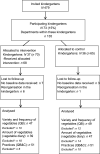Effects of a kindergarten intervention on vegetables served and staff's food-related practices: results of a cluster randomised controlled trial - the BRA study
- PMID: 32077404
- PMCID: PMC7282858
- DOI: 10.1017/S1368980019003963
Effects of a kindergarten intervention on vegetables served and staff's food-related practices: results of a cluster randomised controlled trial - the BRA study
Abstract
Objective: The aim of the current study was to evaluate the effect on frequency, variety and amount of vegetables served and staff's food-related practices in the multicomponent BRA intervention.
Design: Cluster randomised controlled trial, conducted between Spring 2015 and Spring 2016. For allocation of the kindergartens, a stratified block randomisation was used. Data were collected in three ways: (i) a questionnaire for pedagogical leaders assessing the variety and frequency of vegetables served, including staff's food-related practices assumed to be related to vegetable intake; (ii) a questionnaire for kindergarten assistants assessing staff's food-related practices; (iii) a 5-d weighted vegetable diary assessing amount of vegetables served in a department.
Setting: The target group for this study was public and private kindergartens in the counties of Vestfold and Buskerud, Norway.
Participants: A total of seventy-three kindergartens participated.
Results: At follow-up I, the amount of vegetables served increased by approximately 20 g per person per day (P = 0·002), and the variety in served vegetables increased by one-and-a-half kind per month (P = 0·014) in the intervention group compared to the control group. No effects on the frequency of vegetables served or on staff's food-related practices were found.
Conclusions: The BRA intervention was successful in increasing the amount and variety of vegetables served within intervention kindergartens. Further research is needed to understand the mechanisms that can affect the staff's food-related practices.
Keywords: Food-related practices; Kindergarten; Pre-school children; Vegetables.
Figures
References
-
- World Health Organization (2014) Global Status Report on Noncomunicable Diseases 2014: Attaining the Nine Global Noncomunicable Diseases Targets; A Shared Responsibility. Geneva, Switzerland: World Health Organization.
-
- OECD (2012) Health at a Glance: Europe 2012. Chapter: 2. Determinants of Health. Paris: OECD.
-
- Norwegian Directorate of Health (2011) Dietary Advice to Promote Public Health and Reduce Chronic Diseases Methodology and Scientific Knowledge Base National Council for Nutrition (in Norwegian). Report No.: IS-1881.
-
- Mikkila V, Rasanen L, Raitakari OT et al. (2005) Consistent dietary patterns identified from childhood to adulthood: the cardiovascular risk in Young Finns Study. Br J Nutr 93, 923–931. - PubMed
Publication types
MeSH terms
Associated data
LinkOut - more resources
Full Text Sources
Medical



